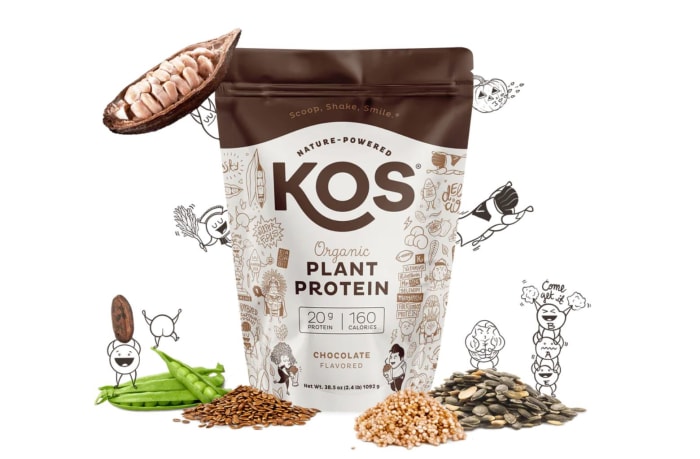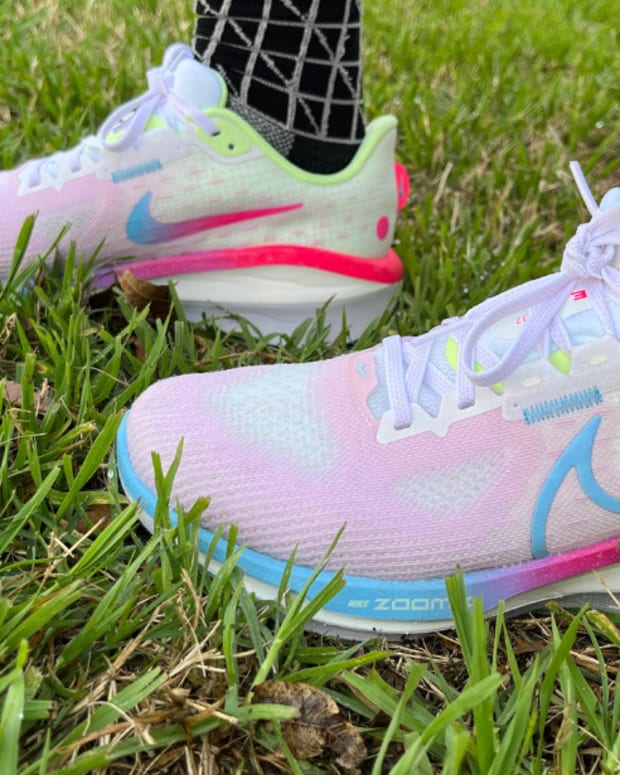The products featured in this article have been independently reviewed. When you buy something through the retail links on this page, we may earn commission at no cost to you, the reader. Sports Illustrated editorial staff are not involved in the creation of this content. Learn more here.
Whey protein is a go-to supplement for bodybuilders to more casual gym-goers. But while whey is often considered the gold standard for conveniently upping your daily protein intake, it’s not the only choice. From slower-digesting casein to healthy-fat-rich hemp, there are plenty of whey protein alternatives to choose from.
In this guide, we’ll go through some of your top options for alternative protein powders and describe how they compare to the nutritional breakdown and digestibility of whey protein. We’ll also share a list of our favorite whey protein alternatives from top-rated brands like Transparent Labs and Naked, and highlight what makes them so great. Whether you’d rather avoid whey altogether or just want to switch up your protein sources, you’ll find a good option here.
This content is meant to be informative, but should not be taken as medical advice. It is not intended for use as diagnosis, prevention or treatment of health problems. Always speak with your doctor before starting any new supplement or exercise regimen.
What is Whey Protein?
Whey protein is a milk-derived protein that’s created during cheese manufacturing. When cheese curds form, liquid whey is left behind. This liquid is then processed to remove the protein from the fat and sugar (lactose). Once the protein is isolated, it’s dried and ground into a powder.
Whey protein is often considered to be superior to other types for a handful of reasons. First, it’s a complete protein, meaning it provides all nine essential amino acids (the amino acids that your body can’t make on its own). It’s also highly digestible. Whey protein has a protein digestibility-corrected amino acid score (PDCAAS) of 1.0.
The PDCAAS is used to evaluate the nutritional quality of different types of proteins. In simple terms, a high PDCAAS means that the protein is high in amino acids and your body is able to absorb and use them. A low PDCAAS means that there are some notable essential amino acids missing, and you may not be fully digesting and absorbing the protein.
Whey is also particularly high in the branched-chain amino acids (BCAAs) valine, leucine, and isoleucine. BCAAs can help stimulate muscle growth (as long as you’re getting enough of the other amino acids) and reduce post-workout muscle soreness.
But whey protein has other health benefits beyond the gym and muscle gain, too. Research shows that whey protein provides antioxidants, combats inflammation, and suppresses appetite, which can promote weight loss. It’s also been shown to help lower blood pressure.
There are two types of whey protein powder: concentrate and isolate. Whey protein concentrate is between 25 and 89 percent protein, while whey protein isolate is further processed to remove most of the lactose and fat. Whey protein isolate is at least 90 percent protein.
Disadvantages of Whey Protein
But while whey protein is undoubtedly a high-quality protein, it does come with some downsides. First, whey protein concentrate contains lactose, which can cause digestive issues like gas and bloating, especially in those who are lactose intolerant. If you want to mitigate this issue, you can opt for whey protein isolate, which undergoes more processing but is higher in protein, lower in carbs, and lactose-free.
The regular use of whey protein has also been linked to body and face acne, due to certain growth factors in the protein that can increase testosterone and insulin growth factor 1 (IGF-1) levels.
Whey protein is also an animal-based protein—it’s derived from dairy. This isn’t necessarily a disadvantage per se, but if you’re avoiding dairy, or prefer to skip animal products altogether, it may not fit into your dietary plan.
Whey Protein Alternatives
Here's the good news: There are many whey protein alternatives, plant-based and not, for those who would rather supplement with something else. While the amino acid profile of these proteins isn’t identical to whey protein, they all have some health benefits to offer.
The specific nutrition facts, like calories, carbs and fats, will depend on which brand you choose (and the extra ingredients that company uses), but the amount of protein should be pretty similar across the board.
Pea
There are different extraction methods used, but in a general sense, pea protein is made by grinding dried yellow peas into a powder. Pea protein contains about 22 grams of protein per 30-gram serving and is unique in that it’s a complete protein (most plant-based proteins are incomplete).
That being said, it is a bit low in methionine, so if you opt for a pea protein supplement, you’ll want to make sure you’re getting this essential amino acid elsewhere—nuts,beef, lamb, cheese, turkey, pork, fish, shellfish, soy, eggs, dairy and beans are all good sources. On the flipside, it’s high in lysine, which helps support your immune system and has been linked to heart health.
Related Post: Pea Protein vs Whey
Soy
Soy is another complete plant-based protein. It’s made by removing the natural fat from the soybeans, and then drying them and grinding them into a powder. Like whey protein, soy protein has a high concentration of BCAAs.
Soy protein is rich compounds called isoflavones that have been shown to reduce the risk of heart disease and certain types of cancers. Soy may also help balance hormones in menopausal women. A 30-gram serving of soy protein contains about 17 grams of protein, plus just under 2 grams of fat and just under 9 grams of carbohydrates (2 of which come from fiber).
Brown rice
Brown rice is often considered a carb source (and it is), but it’s high in protein too. To make brown rice protein, manufacturers use a specialized enzymatic process that separates the starch from the protein. Similar to a whey protein isolate, you’re left with mostly protein and only small amounts of the other macronutrients.
One 30-gram serving of brown rice protein contains 25 grams of protein, plus 4 grams of carbohydrates and only 0.5 grams of fat. About 37 percent of that protein is in the form of essential amino acids, while 18 percent comes from BCAAs.
In one study, researchers compared the effects of brown rice protein and whey protein on exercise performance and body composition. After the 8-week study period, they found that there were no differences in measures of post-workout recovery, soreness, and overall readiness to train between the two types of protein powder.
Hemp
Most protein powders are all protein, but hemp also contains essential omega-3 fatty acids and a considerable amount of fiber. Hemp is also a complete protein, although its PDCAAS is lower than whey’s. Removing the shell increases digestibility, so when shopping for a hemp protein powder, you want to find one contains hulled seeds.
As for nutritional breakdown, hemp protein has just under 12 grams of protein per 30-gram serving, plus 2 grams of fat and 12.5 grams of carbohydrates. About 85 percent of those carbohydrates (or 10.6 grams) are in the form of fiber.
Casein
Casein is the other protein found in milk. Like whey, it’s a highly digestible and bioavailable source of protein, but it has some notable differences. Casein is digested and absorbed more slowly than whey, so it’s often used as a nighttime recovery drink.
Studies show that taking about 40 grams of casein protein 30 minutes before bed (and after resistance training) can help promote muscle recovery. And the protein content is similar to whey—a 30-gram serving contains 24 grams of protein.
Collagen
Collagen is a special type of protein that’s been connected to skin, bone, and joint health. It has an atypical amino acid profile—it’s high in proline and glycine, which are responsible for many of its health benefits, but devoid of cysteine. Because of this, it’s not meant to be your main source of protein.
While whey protein provides all the essential amino acids you need, collagen is more for targeted benefits. It does have a significant amount of protein though, at about 27 grams per 30-gram serving. In short, it’s best to take collagen in addition to whey or one of the other alternatives.
Natural
If you prefer to get your protein strictly from food sources, you have that option too. While there are plenty of studies that show that whey protein supplementation can be beneficial, it’s not absolutely necessary. You can get all the amino acids you need from natural protein sources, like lean meats, eggs, nuts, fish, and high-quality dairy products.
Our Favorite Whey Alternative Products
There are plenty of whey protein alternatives out there, but these are our favorites. They contain high-quality ingredients without added fillers or artificial flavors, preservatives, or sweeteners.
Organic Plant Protein: KOS Organic Plant Protein
Because vegan proteins are incomplete, KOS combined four types—pea, flaxseed, quinoa, and chia seed—to make organic plant protein powder. These proteins complement each other to provide as many essential amino acids as possible. It provides 20 grams of protein, 9 grams of carbohydrates, 6 grams of fat, and 160 calories per two-scoop serving.
It is higher in carbohydrates and fat than whey protein, but it has additional ingredients, like an organic fruit and veggie blend, probiotics, and digestive enzymes, so it also provides more micronutrients while supporting your gut health. It is worth noting that it’s sweetened with coconut sugar though, so some of the carbohydrates come from that. Not only is this protein powder organic, it’s dairy-free, soy-free, gluten-free, and made in the US. It comes in six flavors (all of which are sweetened with the coconut sugar), plus an unflavored version that doesn’t have any sweeteners and a different macro profile.
Check out our KOS Organic Plant Protein review for more information.
Brown Rice Protein Powder: Naked Rice
Naked is all about minimal ingredients. This brown rice protein powder has only one: organic sprouted whole grain brown rice protein. It’s completely free of additives and sweeteners, and is third-party tested to ensure quality and purity. The Naked Rice protein powder is also dairy-free, soy-free, and non-GMO.
It only comes in an unflavored version, but the company recommends mixing it with some fruits and veggies for the best flavor. Two scoops provides 25 grams of protein plus 0.5 grams of fat, 4 grams of carbohydrates—one of which comes from fiber—and 120 calories.
Vegan Rice and Pea Protein: Transparent Labs Organic Vegan Rice and Pea Protein
Rice and pea are complementary proteins, and combining them can ensure you’re getting all the amino acids you need from your protein supplement. The Transparent Labs Organic Vegan Rice and Pea Protein mixes organic rice protein with organic yellow pea protein isolate in a 2:1 ratio. This provides 24 grams of protein per scoop plus 2 grams of fat and 3 grams of carbohydrates.
There are two flavor options—vanilla and chocolate—and the only added ingredients are organic stevia, natural flavor, and Himalayan rock salt. This protein powder is non-GMO and gluten-free.
Plant-Based Protein Shake Powder: Ritual Daily Shake 18+
The Ritual Daily Shake 18+ combines a pea protein base with organic MCT (medium-chain triglyceride) oil. This combo provides 20 grams of protein and 3 grams of carbohydrates (all of which come from fiber) per scoop, plus 2 grams of fast-acting fatty acids that may help keep you full longer.
MCTs have also been connected to weight loss and reductions in inflammation, so if you’re trying to change your body composition, this protein powder may be a good option for you.
It has a vanilla-caramel flavor that comes from natural flavors, and it’s sweetened only with monk fruit. There are limited added ingredients, and the supplement is Informed Sport Certified, which means it’s third-party tested and found to be free of 250 ingredients banned in competitive sports nutrition, like stimulants and diuretics.
Collagen Protein: Swolverine Collagen Protein
The Swolverine Collagen Protein checks all the boxes. It’s made from grass-fed, pasture-raised cows and contains two types of collagen—type I and type III—for maximum benefits. The collagen is also hydrolyzed, so it has superior solubility. In other words, it will mix right into any beverage (even cold ones) without changing the texture or the taste.
As a reminder, collagen isn’t meant to be a 1:1 swap for whey, but it’s a good way to get some extra protein. Each scoop provides 9 grams of protein and only 35 calories. There are no carbs or fat. This collagen is also gluten-free, soy-fee, and non-GMO, plus it’s made in the US.
Casein Protein: Transparent Labs Casein Protein
If you prefer to take your protein powder at night, the Transparent Labs Casein Protein is a great option. It’s made from 100% grass-fed casein protein and has no added sugars, artificial ingredient or preservatives. It’s sweetened with stevia and flavored with cocoa powder. It only comes in the chocolate flavor right now, but reviewers say it tastes great and keeps nighttime cravings away.
The casein used in this protein powder is micellar, which dissolves better and is easier to digest than other types. It contains 25 grams of protein per 35-gram scoop, with only 4 carbohydrates, 0.5 grams of fat, and 120 calories.
Alternative to Whey Protein FAQs
Can I build muscle without whey protein?
Yes, you can build muscle without whey protein. Whey protein provides the building blocks for muscle growth (amino acids), but you can get them by including protein-rich foods in your diet too. That being said, studies do show that consuming whey protein can enhance muscle growth as your body adapts to resistance training.
What is the healthiest form of protein?
It depends on what you’re looking for. In terms of digestibility, bioavailability, and amino acid profile, whey and casein take the cake. But plant-based proteins are rich in antioxidants and other bioactive compounds that have various health benefits. The best form of protein for you depends on your goals and your lifestyle.
Is natural protein better than whey?
If you have to pick one or the other, it’s best to get as much protein as possible from natural food sources. But whey can complement natural protein—it’s not meant to take the place of high-quality protein sources in your diet.
Is whey protein absolutely necessary?
No, whey protein isn’t absolutely necessary. It’s a convenient way to boost your protein intake, but you can get the protein you need from food and/or other protein sources.
Final Thoughts
Whey protein is often considered a superior protein supplement, but it’s not the only option. If you’re looking for a whey protein alternative, pea, soy, casein, and hemp are all potential options. The best protein for you depends on your personal preferences, dietary restrictions and overall health and fitness goals.
Prices are accurate and items in stock as of publish time.















